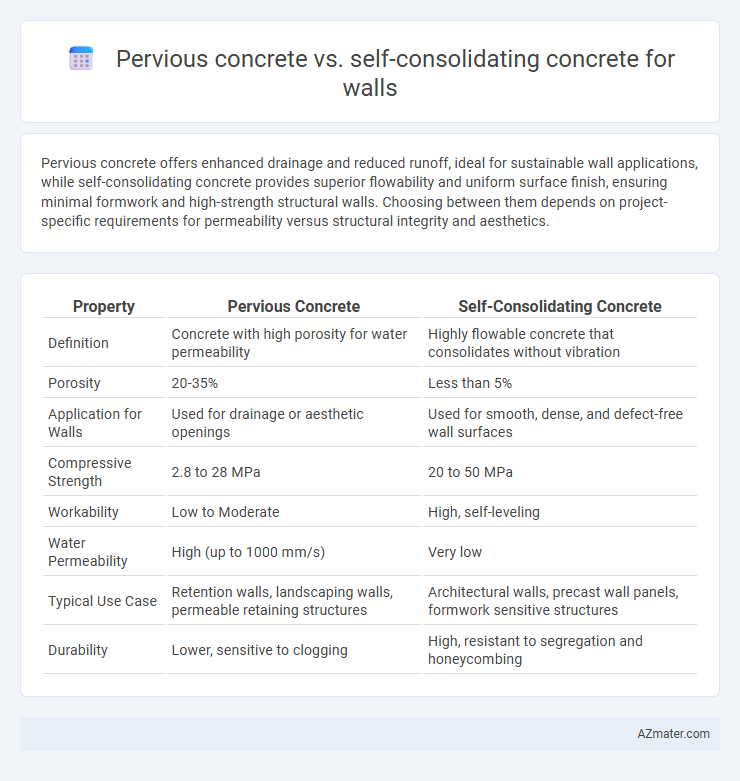Pervious concrete offers enhanced drainage and reduced runoff, ideal for sustainable wall applications, while self-consolidating concrete provides superior flowability and uniform surface finish, ensuring minimal formwork and high-strength structural walls. Choosing between them depends on project-specific requirements for permeability versus structural integrity and aesthetics.
Table of Comparison
| Property | Pervious Concrete | Self-Consolidating Concrete |
|---|---|---|
| Definition | Concrete with high porosity for water permeability | Highly flowable concrete that consolidates without vibration |
| Porosity | 20-35% | Less than 5% |
| Application for Walls | Used for drainage or aesthetic openings | Used for smooth, dense, and defect-free wall surfaces |
| Compressive Strength | 2.8 to 28 MPa | 20 to 50 MPa |
| Workability | Low to Moderate | High, self-leveling |
| Water Permeability | High (up to 1000 mm/s) | Very low |
| Typical Use Case | Retention walls, landscaping walls, permeable retaining structures | Architectural walls, precast wall panels, formwork sensitive structures |
| Durability | Lower, sensitive to clogging | High, resistant to segregation and honeycombing |
Introduction to Pervious and Self-Consolidating Concrete
Pervious concrete is a highly porous material that allows water to pass through, making it ideal for sustainable construction and stormwater management. Self-consolidating concrete (SCC) flows effortlessly under its own weight without segregation, ensuring excellent surface finish and reduced labor in complex wall forms. Both materials offer unique structural and environmental benefits tailored for specific types of wall applications.
Key Properties of Pervious Concrete
Pervious concrete for walls features high porosity, enabling effective water permeability and reducing runoff, making it ideal for sustainable construction and environmental control. Its key properties include low compressive strength compared to conventional concrete, enhanced air and water flow, and minimal use of fine aggregates to maintain void spaces. Unlike self-consolidating concrete, which prioritizes flowability and high strength without segregation, pervious concrete emphasizes permeability and drainage capabilities critical for green building applications.
Key Properties of Self-Consolidating Concrete
Self-consolidating concrete (SCC) for walls exhibits superior flowability and high deformability without segregation or bleeding, enabling rapid placement and reduced labor costs. Its key properties include excellent filling ability, enhanced surface finish, and increased durability due to uniform compaction, making it ideal for complex wall forms and reinforced sections. Compared to pervious concrete, which prioritizes permeability for drainage, SCC focuses on homogeneity and strength to achieve structural integrity and aesthetic quality in vertical applications.
Mix Design Differences for Wall Applications
Pervious concrete mix design for walls emphasizes high porosity by using a reduced fine aggregate content and a carefully controlled water-cement ratio to maintain permeability while providing sufficient structural integrity. Self-consolidating concrete (SCC) for walls features a highly flowable mix with increased fine aggregates, superplasticizers, and viscosity modifiers to achieve superior flowability and stability without segregation, ensuring void-free and smooth finishes. The primary difference lies in the aggregate gradation and admixture types, with pervious concrete prioritizing void space and SCC focusing on rheology and surface quality.
Workability and Placement Techniques
Pervious concrete offers high permeability but requires careful placement using vibration or rodding to prevent clogging and maintain its porous structure, emphasizing its moderate workability. Self-consolidating concrete (SCC) provides superior workability with its highly flowable and non-segregating properties, allowing it to fill complex wall forms effortlessly without mechanical vibration. For wall applications, SCC enables faster and more uniform placement, whereas pervious concrete demands more precise handling to ensure the integrity of its porous matrix.
Structural Performance in Wall Construction
Pervious concrete offers enhanced drainage and reduced weight, which can improve wall durability but may compromise compressive strength compared to conventional mixes. Self-consolidating concrete (SCC) provides superior flowability and uniformity, resulting in dense, high-strength walls with excellent structural performance and minimal defects. SCC's ability to fill complex formwork without vibration makes it the preferred choice for load-bearing wall construction requiring high structural integrity.
Durability and Longevity Comparison
Pervious concrete offers excellent durability in applications requiring permeability, allowing water drainage that reduces freeze-thaw damage and surface cracking, extending wall lifespan in climates with heavy precipitation. Self-consolidating concrete (SCC) provides superior durability for wall structures due to its dense, uniform microstructure and high resistance to segregation and honeycombing, resulting in enhanced compressive strength and reduced maintenance over time. While pervious concrete excels in drainage and freeze-thaw resilience, SCC outperforms in structural longevity and durability under high load-bearing conditions and harsh environmental exposure.
Environmental Impact and Sustainability
Pervious concrete reduces stormwater runoff by allowing water infiltration, enhancing groundwater recharge and mitigating urban flooding, thereby promoting sustainable water management. Self-consolidating concrete (SCC) improves durability and reduces the need for mechanical compaction, lowering energy consumption and labor costs in wall construction. While pervious concrete excels in environmental benefits related to water permeability, SCC contributes to sustainability through improved material performance and reduced construction waste.
Cost Considerations for Wall Projects
Pervious concrete for walls offers cost savings through reduced stormwater management expenses and lower environmental compliance fees due to its permeability. Self-consolidating concrete (SCC) increases initial construction costs because of higher material prices and admixture requirements but can reduce labor and formwork expenses by improving flowability and minimizing vibration. Project budgets should weigh these factors against long-term maintenance and durability implications to determine the most cost-effective solution.
Best Use Cases: Choosing the Right Concrete for Walls
Pervious concrete is ideal for walls in sustainable construction projects where water permeability and drainage are critical, such as retaining walls or landscape barriers to reduce runoff. Self-consolidating concrete excels in intricate formworks or thin-wall structures requiring superior flowability, high strength, and impeccable surface finishes without the need for vibration. Selecting the right concrete depends on project requirements like structural complexity, water management, and aesthetics.

Infographic: Pervious concrete vs Self-consolidating concrete for Wall
 azmater.com
azmater.com